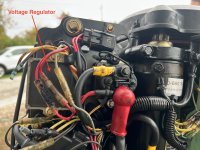Hi Folks,
First post from a long time lurker. Trying to figure out what's up with this situation. The two yellow wires from the stator to the regulator are corroded and burnt to the point that they are split. Here's the weird thing. Boat has been running/charging fine for the last season with this condition. We don't currently run any accessories beyond a bilge pump wired directly to the battery. So what should my plan be with this? We are going to restore a bunch of the boat this summer and get it all working again (gauges etc). I'm good with electrics but boat is in storage and can't get to it for the next month or two to meter everything. Note the red wires just look fried by proximity to yellow ones.

First post from a long time lurker. Trying to figure out what's up with this situation. The two yellow wires from the stator to the regulator are corroded and burnt to the point that they are split. Here's the weird thing. Boat has been running/charging fine for the last season with this condition. We don't currently run any accessories beyond a bilge pump wired directly to the battery. So what should my plan be with this? We are going to restore a bunch of the boat this summer and get it all working again (gauges etc). I'm good with electrics but boat is in storage and can't get to it for the next month or two to meter everything. Note the red wires just look fried by proximity to yellow ones.




















